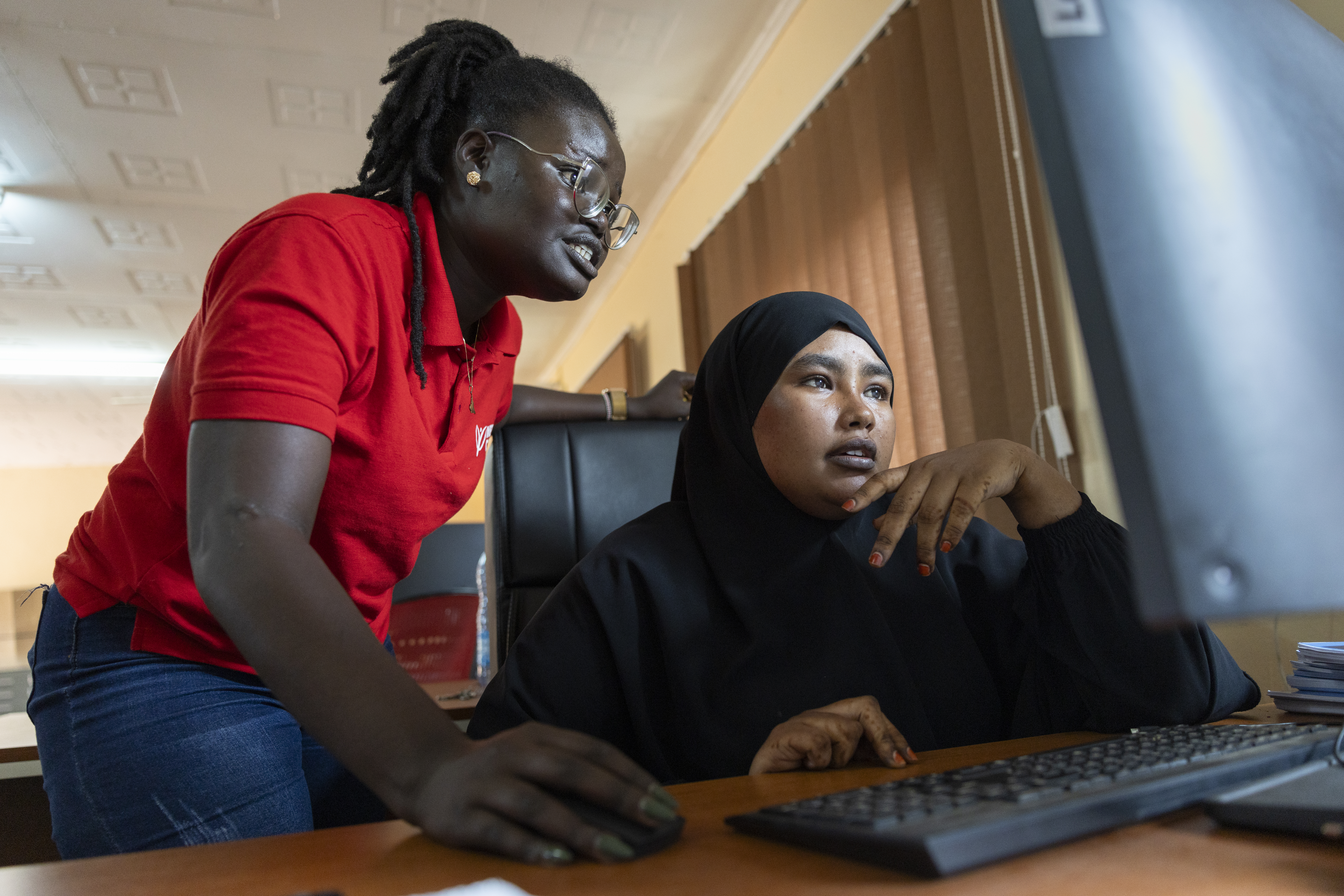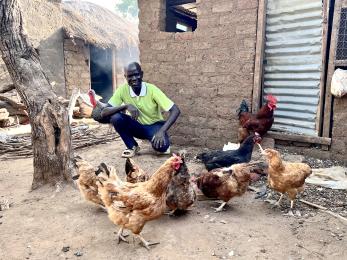Meet the world's bravest mothers

Across the globe, mothers face extraordinary odds to help their children grow up healthy, happy and strong. Every single day we meet women who inspire us with their strength and determination to get their families through the harshest of circumstances.
Below, meet some of the bravest mothers we’ve met — women who, despite living in the most extreme environments, are finding ways to survive conflict, fight hunger and lift themselves out of poverty, all in the name of their children.
Rajani in Nepal
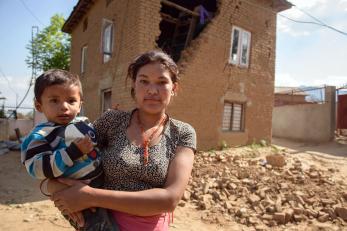
When the walls and floor started violently shaking around her, Rajani frantically grabbed her three-year-old son and ran out the door of their home in Kavresthali, in the Kathmandu District of Nepal.
Her husband was at work when the 7.8-magnitude quake struck on Saturday, April 25. It was the worst to hit the region in 80 years, affecting around 8 million people and destroying businesses and homes, including Rajani’s. She and her terrified family were forced to sleep outside in the rain for the first two nights after the disaster.
We were the first to reach Rajani's small village, which had been bypassed as operations focused either on the capital or getting to farther outlying areas. We supplied them with an emergency kit that included a tarp, sleeping mat, blanket and basic hygiene supplies to help get them through the immediate aftermath.
But Nepal is one of the poorest countries in the world and the road to recovery will be long — Rajani and other mothers affected by this disaster will need our continued support in order to rebuild their families’ homes and lives.
Furaha in Democratic Republic of Congo

While her name means "joy" in Swahili, Furaha has endured a string of shocking tragedies in eastern Congo, one of the poorest and most conflict-ridden parts of the world.
After she lost her oldest two children to illness and her husband left, Furaha cared for her two younger children on her own by running a small restaurant in her rural village — until one of the many armed groups in the region attacked in the middle of the night. They looted her home and business and raped her. When she gave birth nine months later, the violence became too much to bear.
Furaha fled to a displacement camp with her newborn and two children. There, she benefitted from the hygiene trainings and clean water Mercy Corps provided — support that became even more critical when she adopted a premature baby girl, right after she was orphaned in childbirth.
Now living on the outskirts of Goma so she can look for work and get better medical care, Furaha still struggles every day to find enough food to feed her children. Yet her love and determination seem to know no bounds as she perseveres to give her family a healthy life.
Nadezhda in Ukraine
When a shell landed mere meters from where Nadezhda was riding her scooter, her life was changed forever. Her nine-year-old daughter who was riding with her was killed, and Nadezhda lost her leg.
Since conflict erupted in Ukraine, her family’s life in the frontline village of Triokhizbenka has been torn apart. Although she’s devastated by the loss of her oldest daughter and remains haunted by the sounds of gunfire and shelling, Nadezhda continues to be a dedicated mother to her eight-month-old baby.
Unless heavy shelling hits their neighborhood again, the family is committed to staying in their home and holding onto what’s left of the life they had before the war.
Tchima in Niger
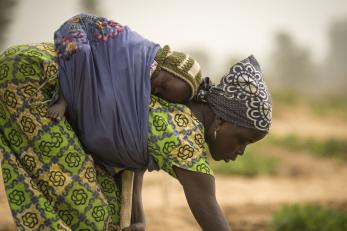
In Tchima’s rural village outside of the capital city of Niamey, 60 percent of children are malnourished. But she’s working hard to make sure her children beat those odds.
While her baby sleeps peacefully on her back, she tends the garden she and other women in her community started with Mercy Corps’ help. Through the program, Tchima is learning how to grow a wide variety of healthy crops to feed her family.
The new foods, including tomatoes, lettuce, cabbage and sweet potatoes, will help her provide her children with all the nutrients they need to grow up healthy and strong.
Mahsim in South Sudan

When conflict hit her village in the Nuba Mountains in Sudan, Mahsim and her six children fled for safety to Yida refugee camp in northern South Sudan.
But the turmoil followed her across the border. Shortly after, in 2013, South Sudan was plunged into crisis when political and ethnic violence spread throughout the new country, forcing millions to run for their lives. Tens of thousands more people have since joined Mahsim in Yida camp, uncertain of when they will be able to go home again.
As a refugee, Mahsim spends her days providing for her family the best she can: collecting water, waiting for food distributions and gathering firewood from the bush. She dreams of the day there is peace — the day they can return to their home in the Nuba Mountains.
Marialena in Colombia
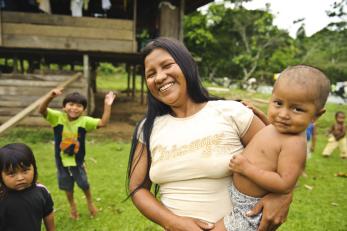
Marialena and her family are part of the Embera Katio Chidima tribe in the rugged, rural Darién region of northern Colombia. Formal land ownership for marginalized communities like hers is a vital means of stability — it can be a source of food, income and safety.
But indigenous land like theirs is at risk of intrusion by other groups like coca growers, cattle ranchers and timber interests — and tensions are high.
We’re helping rural communities like Marialena’s rise above violence and peacefully resolve the land conflicts they’re up against. Because with legal rights to the property they live on, vulnerable mothers like Marialena can build stable, thriving homes for their families.
Hayat in Jordan
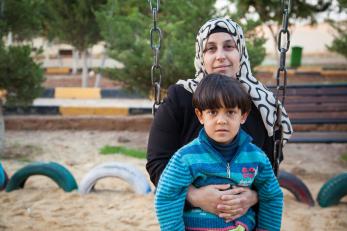
Hayat came to Jordan with her five children to escape the violence that is ravaging Syria. Her husband went missing during the war, and she refused to lose her children as well.
But more than 600,000 Syrians have flocked to Jordan for safety, and tension between the two peoples has skyrocketed as resources like jobs and housing dwindle.
Although she felt scared and alone when she arrived in her host community, Hayat became a community leader in a Mercy Corps program that brings Syrians and Jordanians together to learn how to relate to one another, resolve conflicts and collaborate on ways to improve the community for everyone. With Hayat's help, her community leaders group built a playground in her host neighborhood.
Now, Jordanian and Syrian families in her community have a place to gather, play and forge supportive relationships that will help them get through this crisis.
Floridalma in Guatemala
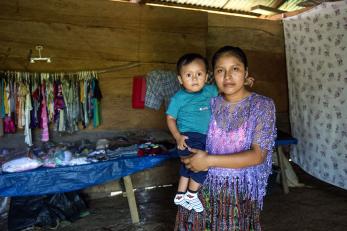
When Floridalma’s pregnancy did not go as planned, she was raced to the hospital for an emergency C-section.
In Guatemala, around 80 percent of the population lives in poverty, and most families don’t have the money to pay for urgent medical transportation. Mercy Corps had helped Floridalma’s community start an emergency fund for women and babies needing critical care, so Floridalma and her husband were able to immediately borrow from the fund when they needed it most.
Because of their quick thinking and her entire community's commitment to maternal and child health, the first-time mother and her baby stayed safe.
Dhaki in Ethiopia

Before we met Dhaki, in the lowlands of Ethiopia, her three young children did not have enough to eat each day.
In rural areas of the country, cultural behaviors and environmental challenges prevent families from getting the food they need to be healthy. But we helped Dhaki learn how to incorporate a larger variety of foods, like sanitized milk, corn bread and potatoes, into her family’s diet.
Today, Dhaki is focused on making sure her three young children have access to the fresh, nutritious food they need to develop and succeed, and she’s proud to say her entire family is now eating three diverse meals a day.
Umi in Indonesia
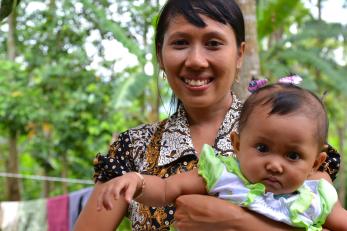
As a leader in her local mothers support group, Umi, a mother of one, teaches pregnant women and mothers in her community how to care for themselves and their babies.
Child stunting rates are high in Indonesia, where education about maternal and child health is low, and mothers traditionally feed their newborns inadequate baby formulas instead of breast milk. But through the mothers support group, Umi empowers women with the knowledge they need to instead help their babies grow healthy and strong.
She teaches mothers about self-care during pregnancy, exclusive breastfeeding, maternal nutrition and how to nourish their children throughout early childhood. Umi’s community is filled with happier, healthier mothers and children, thanks in large part to her.
Today — and every day — we celebrate mothers in every nation who fight challenges, brave crises and make tremendous sacrifices to improve the lives of their children. The world is a better place because of them.
